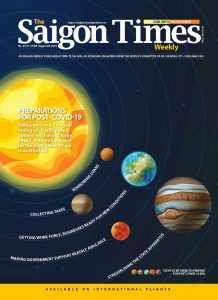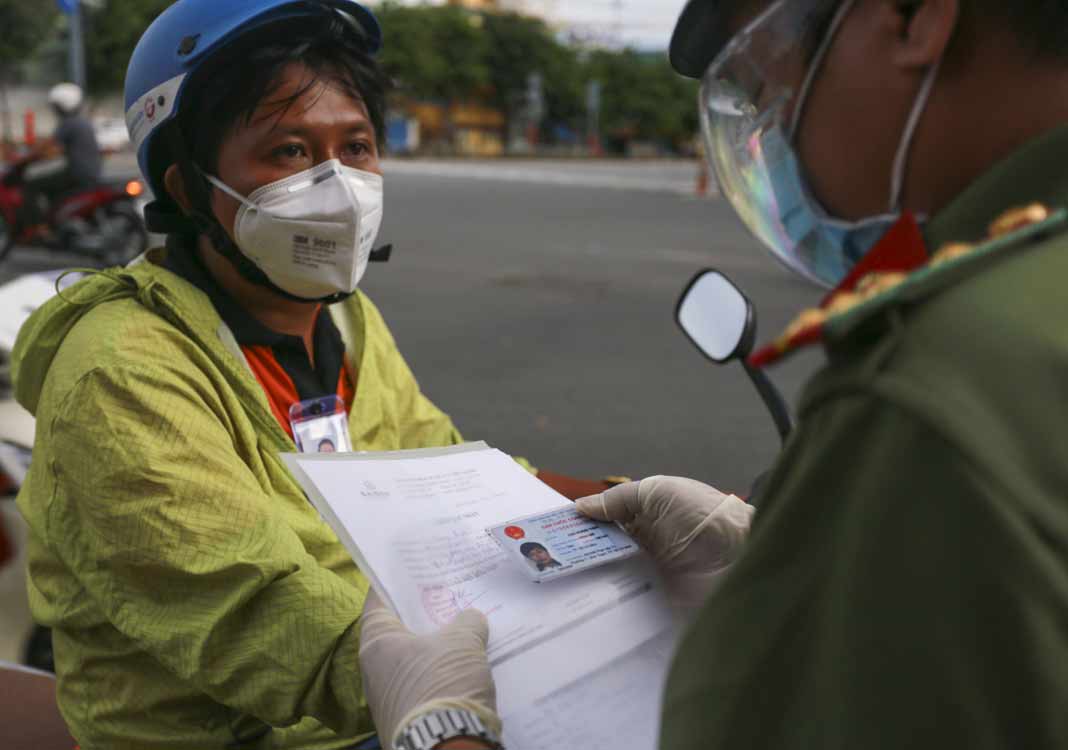A consensus on the goal of legal principles is an important precondition for unity in selecting appropriate measures to cope with new or special situations. However, debates on measures as well as conducts in the time of emergency when the Covid-19 pandemic is quickly spreading in HCMC and the southern provinces have proved that such a requirement of consensus is hard to fulfill.
I would like to start my article with a story about the wedding ceremony of two of my colleagues at a restaurant in a small city almost 20 years ago. After the initial steps, the wedding party continued with the champagne tower ceremony—in Vietnam, it is often the moment when the wedding couple pours wine onto a tower of glasses which has been carefully prepared before. At the wedding party I was attending, the second bottle of wine was then opened and the bride and the groom excitedly did their job. Suddenly, the pyramid of glasses collapsed. The minor incident was immediately tackled so that the ceremony could continue to the end. It can be said, however, that this wedding party is the quietest among those I have attended over the past two decades.
The champagne tower ceremony is indispensable at wedding ceremonies in Vietnam nowadays. But one thing can be said for sure: different from the countries from where those ceremonies originate, Vietnam’s “culture of revelry” leaves little time for young people at wedding parties to make good use of wine glasses and the champagne in them. Meanwhile, old habits—worries about mishaps or luck at a wedding party—die hard. Therefore, to a class of people, it would be normal if an unexpected problem happens; however, to another class of people who are desperately worried about the unpredictable or are extremely mindful, ceremonies may be prone to mishap.
Fortunately, the two friends of mine have been happy during their married life. Yet the unhappy moment of their wedding ceremony also gives us some food for thought. Why should we make ourselves so miserable with all the risky ceremonies? If something is prone to risk, why heartily embrace it and then when a problem arises, we blame our mishap on the ceremony.
In essence, whatever the reasons may be, all ceremonies and regulations in the world are created by humans. Some of them are to be applicable to unprecedented events. That they must be always correct for all a priori assumptions is too demanding. And it’s true, too, that sometimes there aren’t enough experiences for a posteriori assumptions. In other words, it’s hard to find absolute truth in human cognition. Therefore, it is also common for somebody to remark that certain decisions made during the days of the unprecedented Covid-19 is wrong or inappropriate. What really counts is what the decision maker chooses is and whether that person is ready to change his/her selection or not.
In fact, to seek an alternative replacement and avoiding a possible “wrong place,” the decision maker should raise questions on opposite experiences. Would the a priori and a posteriori assumptions for a new regulation be enough and reliable? Are existing theories of and experiences in economy, market and business operations compatible with the conditions of the social distancing in the pandemic? Even so, what are the requirements and the goal for pandemic fight, and are market wishes compatible with the goals of pandemic fight or reduction of losses when the pandemic breaks out?
Surely enough, a coin with two identical sides is fake. Therefore, facing and accepting losses when choosing either side of the coin is inescapable. The decision maker, therefore, has to clearly identify the goal in his or her decisions.
Of course, such a selection is tough to make, and sometimes requires courage. In reality, not all policymakers or decision makers are “supermen.” Therefore, that they resort to the intellectual of the society at large, at least the elite, is significant, or even decisive to the right choices of policies. In the prime time of the fight against Covid-19 in early July, the meeting between HCMC Party Secretary Nguyen Van Nen and many epidemiologists was the critical moment based on which the municipal leadership could made a crucial decision to protect the city’s dwellers’ health. Options for changes or revisions of policies after feedback has been received have created positive effects on the long thorny journey ahead.

However, under many circumstances, a principle can be said to be “bad,” but it is difficult to change it. Or in order to change or replace that principle, it would take too much time to have new experience and recognition. In such a circumstance, there is no other way rather than temporarily accepting it and flexibly putting it into action. Such a selection is a precious experience for those who are on duty.
Now be back to the wedding formalities, it is not quite easy-going when making a close comparison between this risk and the circumstance that the city has been on the line in the fight against the Covid-19 pandemic for two months now. Yet the two stories took place in special backdrops when special principles have appeared and pre-arranged. In reality, to diminish risks, restaurants where wedding parties are organized maintain the protocol of champagne tower with a pyramid of glasses linked together by pieces of sticky tape.
In return, the “flexible application” of legal principles at this sensitive period may be risky, too, and prone to controversy. Setting up checkpoints and restrictions of people moving around have been once opposed. However, obviously, without stringent restrictions, there would be no way to implement the “stay-at-home” order. Of course, when the ban on leaving the city is enforced, governments of cities and provinces have to find appropriate ways to ensure the people’s livelihoods and safety. That at least proves that controversy is real and also clearly indicates the principles and issues currently in need of being tackled. In other words, it shows whether the purpose of the municipal authorities and the central Government is to curb the infection or another issue.
It should be understood that the approach to a principle so as to handle a situation and solve a problem effectively is not simply making use of the principle to point out which is on the right or on the left, or right or wrong. If it cannot be asserted, then disputes between the two opposing camps in the stories, such as “bread” or “necessities” or “the distance among artists” might continue indefinitely.
A research study has indicated that lawyers and policymakers, and politicians and political economists often share the same issue. Yet the biggest difference among them is the demand to find the answer to the question as to what the law is or how it should be. Evidently, only the second question can convey adequately the information required of by a politician or a lawmaker. Meanwhile, lawyers pay attention to the first question. Even so, when the formal legalism took shape, lawyers have paid more attention to principles and regulations, and less to other issues.
Luckily, this situation has changed and there has been more interference between the lawyers’ circle and people in the corporate sector. Gradually, lawmakers have also employed theoretical tools to better understand how the market works and no longer simply handle it only in accordance with their assumptions. It can be said, therefore, that it is not by chance political economists and lawyers have adopted the same way of describing the market using the same voice which depends largely on what has actually happened rather than past precedents.
Therefore, although it is necessary to distinguish the right from the left and the right from the wrong before setting a legal principle, it is sometimes not as important as explanations of “whys” and “hows.” To make it happen, the identicality of the approach to the principle as well as the mutual understanding of policymakers and those who analyze, utilize or are affected by that principle matters much in the process of receiving, experiencing and forming new principles which become effective from that moment onward.
Above all, the dilemma caused by the Covid-19 outbreak has reminded us of this truth. Even when the pandemic is over, this truth remains necessary as a new principle or a decision comes.
By Truong Trong Hieu(*)
(*)University of Economics and Law, Vietnam National University – HCMC









